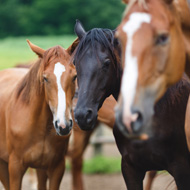New insights into laminitis risk factors

Cold-blooded animals <149cm, including certain native ponies, and those kept on high quality pasture were at greater risk of developing laminitis.
It may soon be possible to identify horses at risk of developing pasture-associated laminitis by checking hormone and insulin levels, as well as body condition, breed type and environment.
Two new studies carried out in collaboration with the Waltham Equine Studies Group have provided fresh insights into the condition, which manifests in the foot and causes varying levels of pain, lameness and debilitation.
A team led by Nanna Luthersson looked at the risk factors in a group of Danish horses and ponies. Their work confirmed that cold-blooded animals <149cm, including certain native ponies, and those kept on high quality pasture were at greater risk of developing laminitis.
The study, which was published in the Journal of Equine Veterinary Science, also showed that a change in the type and amount of grass eaten is significant at all times of the year, not just in spring as commonly thought.
A second study was carried out with Nicola Menzies-Gow of the Royal Veterinary College. It revealed that low concentrations of the adipose tissue derived hormone adiponectin, along with high serum insulin concentrations, could predict an increased risk of pasture-associated laminitis in future.
It is hoped that future work will create more robust cut off values, to allow more accurate predictions of laminitis in individual animals.
Commenting on the findings, Spillers research and development manager Clare Barfoot, said: "The Danish study gives us important practical facts about the susceptibility of cold-blooded types, and is particularly applicable to natives in the UK.
"The second study gives hope that there may soon be a test or series of tests that will help predict those at an increased risk of suffering from pasture associated laminitis in the future thereby reducing the number of animals affected by this debilitating condition.
"In the meantime until we fully understand the condition it is sensible to manage all the risk factors we currently know about, in particular keeping your horse at a healthy weight."



 The veterinary mental health charity Vetlife is inviting the veterinary community to join it for a sponsored cold-water dip.
The veterinary mental health charity Vetlife is inviting the veterinary community to join it for a sponsored cold-water dip.